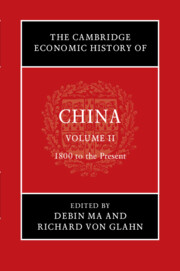Book contents
- The Cambridge Economic History of China
- The Cambridge Economic History of China
- The Cambridge Economic History of China
- Copyright page
- Contents
- Figures
- Maps
- Tables
- Contributors to Volume II
- Acknowledgments
- Note on Citations
- Introduction to Volume II
- Part I 1800–1950
- 1 Ideology and the Contours of Economic Change
- 2 Economic Transition in the Nineteenth Century
- 3 Agriculture
- 4 Handicraft and Modern Industries
- 5 The State and Enterprises in Late Qing China
- 6 State Enterprises during the First Half of the Twentieth Century
- 7 Money and the Macro-economy
- 8 Public Finance
- 9 Financial Institutions and Financial Markets
- 10 Chinese Business Organization
- 11 The Economic Impact of the West
- 12 Foreign Trade and Investment
- 13 Transport and Communication Infrastructure
- 14 Education and Human Capital
- Part II 1950 to the Present
- Index
- References
1 - Ideology and the Contours of Economic Change
from Part I - 1800–1950
Published online by Cambridge University Press: 07 February 2022
- The Cambridge Economic History of China
- The Cambridge Economic History of China
- The Cambridge Economic History of China
- Copyright page
- Contents
- Figures
- Maps
- Tables
- Contributors to Volume II
- Acknowledgments
- Note on Citations
- Introduction to Volume II
- Part I 1800–1950
- 1 Ideology and the Contours of Economic Change
- 2 Economic Transition in the Nineteenth Century
- 3 Agriculture
- 4 Handicraft and Modern Industries
- 5 The State and Enterprises in Late Qing China
- 6 State Enterprises during the First Half of the Twentieth Century
- 7 Money and the Macro-economy
- 8 Public Finance
- 9 Financial Institutions and Financial Markets
- 10 Chinese Business Organization
- 11 The Economic Impact of the West
- 12 Foreign Trade and Investment
- 13 Transport and Communication Infrastructure
- 14 Education and Human Capital
- Part II 1950 to the Present
- Index
- References
Summary
When visited by the British trade mission led by Lord George Macartney, who aimed to show off the best of Western trade and technology, the Qianlong Emperor of Qing China was known to have famously replied in 1792, “Our Celestial Empire possesses all things in prolific abundance and lacks no product within its borders. There is therefore no need to import the manufactures of outside barbarians in exchange for our own produce.” Qianlong’s statement came at the height of Qing’s glory, overseeing a remarkable tripling of population and a doubling of territory between the fifteenth and eighteenth centuries. No single political entity at the time achieved such size in both geography and population under such stability and durability.
Keywords
- Type
- Chapter
- Information
- The Cambridge Economic History of China , pp. 15 - 47Publisher: Cambridge University PressPrint publication year: 2022

